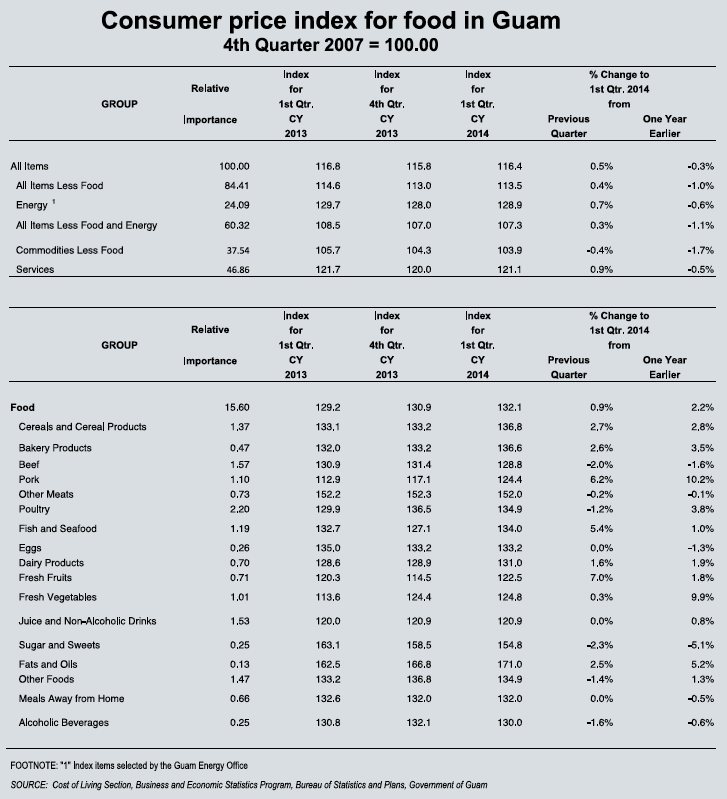
With the onset of droughts and grain shortages in key farming regions, supplies of produce and meat in the United States are growing scarcer, leading to fluctuations in commodity prices across the board. As the crises continue to affect stateside suppliers and as fuel costs continue to rise, it falls to local wholesalers to determine how they plan to deal with pricing and supply issues in the year ahead.
 “Every beverage that’s made in the U.S. will be affected [by the drought],” says Frank S.N. Shimizu, president of Ambros Inc. “If there’s going be a drought in the farming regions, there’s no doubt we’ll be affected. All of our beverages, especially our beer, depend on grains. I’m not sure about the consumer and institutional products because they’re more chemically oriented, but certainly our beers, wines and distilled spirits will be affected. One particular instance of this is Maker’s Mark out of Kentucky. Usually, we do about 300 cases a year, but we got cut off from our allocation this year because there was a shortage.”
“Every beverage that’s made in the U.S. will be affected [by the drought],” says Frank S.N. Shimizu, president of Ambros Inc. “If there’s going be a drought in the farming regions, there’s no doubt we’ll be affected. All of our beverages, especially our beer, depend on grains. I’m not sure about the consumer and institutional products because they’re more chemically oriented, but certainly our beers, wines and distilled spirits will be affected. One particular instance of this is Maker’s Mark out of Kentucky. Usually, we do about 300 cases a year, but we got cut off from our allocation this year because there was a shortage.”
Shimizu says that business is expected to go on as usual, but Ambros is trying to hold off on any price increases until later in the year. “We only adjust our prices once a year,” Shimizu says, “And we only adjust them upward or downward — and very seldom downward — very early or late in the year.” Because of this, Shimizu adds that if ocean freight charges continue to rise at a rate of two or three times per year, it could have an adverse effect on the company’s business.
However, in spite of the potential speed bumps, Shimizu remains upbeat and eager to celebrate the company’s 65th anniversary with a big upcoming promotion. In addition to the brand new consolidated Ambros facility and environment-controlled warehouse, the company has improved and expanded its whiskey portfolio and is looking to grow its beer portfolio even further in the coming year.
“We’re looking into adding one or two craft beers to our beer portfolio, and we’ll also be adding some non-beverage products to our lineup soon because of a couple of mergers involving Kimberly- Clark and Global,” he says.
 Edward J. Calvo, general manager of Mid Pacific Distributors and Island Wines & Spirits, says he doesn’t feel that the droughts will have as strong of an effect on the wholesale beverage industry. The two companies also import non-alcoholic beverages, beer, wines and spirits and are also sister companies to Pepsi Cola Bottling Co. of Guam under the Calvo family umbrella.
Edward J. Calvo, general manager of Mid Pacific Distributors and Island Wines & Spirits, says he doesn’t feel that the droughts will have as strong of an effect on the wholesale beverage industry. The two companies also import non-alcoholic beverages, beer, wines and spirits and are also sister companies to Pepsi Cola Bottling Co. of Guam under the Calvo family umbrella.
“Issues in the key farming regions will always have some effect on pricing,” Calvo says, “But the suppliers we primarily deal with are major suppliers that are able to overcome any of those issues and find a source for their products globally. So whether it’s corn or hops for beer, or grapes for the wine products, or different ingredients for the various spirits, it’s not a major pricing concern. What we look at more is packaging because we deal in a lot of aluminum, and that tends to be a bit more out of control. If you really look at the past two decades, the price of beer would be more impacted by the price of packaging than the price of ingredients.”
Calvo adds that the biggest concern for the two companies right now is fuel and by extension, shipping costs. “Droughts, shortages, aluminum prices … nothing holds a candle to the increase caused by fuel and shipping increases,” he says.
In terms of how the companies plan to deal with the issues, however, he says that product diversification will be key to weathering the storm. “We look at product variations,” he says. “We have such a diverse portfolio that we can listen to the market, see where the demand is and shift accordingly. When prices on a popular product go up due to manufacturing or logistics costs, it may begin to price itself out of the market. And the market will either adapt or move to another tier of products. […] The market demand is constantly shifting, and we try to adapt to it as best as we can.”
Calvo says that the companies will be unveiling a variety of new products in the year ahead, including Red’s Apple Ale, an assortment of seasonal beers and the relaunch of Dos Equis. IWS is also adding a variety of wines to its stable, as well as new spirits including Jack Daniels Tennessee Honey whiskey, Don Q rum, and Tito’s Homemade Vodka.
“In addition to several new whiskey and wine dinners we’ll be hosting in the near future,” he says, “we’re also unveiling a three-part series of promotions called Cheers Guam, which will consist of a Spirits Carnival, a beer event which will be tied to an Oktoberfest-style promotion and a wine event, which will be closer to the holidays.”
 On the less liquid side of the wholesale industry, Christine W. Baleto, general manager for Market Wholesale Distributors Inc., agrees that the droughts will have a detrimental effect on the prices of certain products across the board. “Especially with pork and beef,” she says. “The [Porcine Epidemic Diarrhea] virus is affecting the pork stock, and the droughts are affecting the beef stock. Of course, some prices are just historically higher during the summer period, but other prices are going to be rising as well, and as meat prices skyrocket, consumers will most likely tend toward the more affordable types of protein.”
On the less liquid side of the wholesale industry, Christine W. Baleto, general manager for Market Wholesale Distributors Inc., agrees that the droughts will have a detrimental effect on the prices of certain products across the board. “Especially with pork and beef,” she says. “The [Porcine Epidemic Diarrhea] virus is affecting the pork stock, and the droughts are affecting the beef stock. Of course, some prices are just historically higher during the summer period, but other prices are going to be rising as well, and as meat prices skyrocket, consumers will most likely tend toward the more affordable types of protein.”
According to Baleto, produce is also an issue, as the drought in California is having a heavy impact on the production of fruits and vegetables, in particular avocados, lettuce and berries.
“We’re expecting a price rise upwards of 20% in the latter part of this year,” Baleto says, “But with those types of products, there’s always some type of demand, so we don’t stop bringing it in. But we do keep track of consumers’ buying habits and adjust supply based on consumer demand.”
Baleto also addressed the impact that rising fuel costs have on the wholesale industry. “On Guam, we import over 90% of the goods we use, so everything is dependent on shipping. Matson recently just released a notice that shipping will be going up another 3%. Last year, they were able to lower the percentage about 9% over the latter part of 2013, but we’ve seen two increases this year, and the Port Authority has also seen tariff increases. And anytime those increases come in, we have no choice but to pass those costs on. But I think with us, as a wholesale company, we can’t charge a lower price and try to maintain that price structure because of our competitors. These are issues that affect everyone across the board.”

However, Baleto does add that one product where this might not be the case is rice, as some wholesalers, like Market Wholesale Distributors, get their rice from farming regions in California, whereas other wholesalers might be able to source their race through Asia, which could give them a bit of an advantage.
As a supplier with a direct relationship with U.S. Foods, MWD is responsible for all of the products under the extensive U.S. Foods umbrella. “As a major food supplier in the U.S., U.S. Foods is responsible for quite a few of the products we bring in for local franchises like Yogurtland, Froots and Beard Papa,” Baleto says. “So if a franchise uses U.S. Foods products, we become their conduit to get those supplies to Guam.”
She adds, however, that because the U.S. Foods catalog of available products is so comprehensive, they can’t make all of the products available on Guam at one time. Instead, Market Wholesale Distributors conducts market testing to see what products do and don’t work, as local tastes run slightly differently from mainland tastes. She cites applesauce as a prime example, saying that it’s one of the best-selling children’s foods in the states, but it sells somewhat poorly here. Some of Market Wholesale Distributors’ new products in the upcoming year will include new frozen products from Kellogg’s and an entire line of new products under Smucker’s.
 George K. Lai, president of Quality Distributors, agrees that prices on pork, beef and poultry have all risen drastically since the onset of the farming crises. “All of the prices lately have gone up, and I’m sure we can attribute that to the droughts,” he says. “The cost of goods is rising, the cost of fuel is rising, and I don’t think we’re going to see prices go down anytime soon.”
George K. Lai, president of Quality Distributors, agrees that prices on pork, beef and poultry have all risen drastically since the onset of the farming crises. “All of the prices lately have gone up, and I’m sure we can attribute that to the droughts,” he says. “The cost of goods is rising, the cost of fuel is rising, and I don’t think we’re going to see prices go down anytime soon.”
However, Lai says that Quality attempts to buy smart whenever it can in an attempt to pass savings on to the consumer. “These are commodities we’re dealing with, so the prices do tend to go up and down,” he says. “So with popular items, or items that we know are crucial, we try to buy them in much higher quantities when their prices are lower. Because we have the sufficient capacity and the right conditions to store certain goods for extended periods of time, we prefer to buy whole containers of those goods instead of buying them in smaller batches. Especially with chicken, beef and pork, we try to buy as much as we can if and when the time and the pricing are right, and we pass the savings on to the consumers.”
When asked what might be done about the rising costs of fuel and shipping, Lai says, “[…] because of the Jones Act, we’re limited in terms of carriers that we can use because Guam has to be served exclusively by American carriers. Matson is an excellent carrier, but there’s very little for them here in terms of competition.”
Lai says that there are several new products on the way at Quality that he’s quite excited about including Black Mountain aged angus beef from Lincoln Provisions, farm-raised cobia fish from Panama and artisan frozen dough from French Gourmet, a maker of pre-proofed ready-to-bake pastries.
 Michael Brown, vice president of Micronesian Brokers Inc., says it remains to be seen whether MBI’s beef or dairy offerings may see pricing pressures. “Food and beverage pricing is always under pressure,” he says, “And not just from inclement weather or grain supply shortages; for example, we have some pretty tough shipping and handling costs to contend with when bringing products to this part of the world, so pricing and service expense control have got to always be under very tight scrutiny.”
Michael Brown, vice president of Micronesian Brokers Inc., says it remains to be seen whether MBI’s beef or dairy offerings may see pricing pressures. “Food and beverage pricing is always under pressure,” he says, “And not just from inclement weather or grain supply shortages; for example, we have some pretty tough shipping and handling costs to contend with when bringing products to this part of the world, so pricing and service expense control have got to always be under very tight scrutiny.”
Brown says MBI does source several of its products from outside the United States including Ox & Palm corned beef products from Heinz in Australia; Anchor dairy products from Fonterra in New Zealand; and Selecta ice cream and Sunkist Juices from Unilever in the Philippines.
He also addresses other factors that could affect MBI’s pricing in the days to come, such as the proposed minimum wage increase. “The proposal is for a 39% increase to the minimum wage, and you can be sure there will be a ripple effect on the overall price of all goods and services, not just food and beverage.”
 James S. Herbert III, general manager of Triple J Five Star Wholesale Foods, says the droughts will affect distribution in the days ahead. “Out of our products being affected, certainly produce is a big one, and then, of course, the pricing of all of our protein products — beef, chicken, pork — has gone up, and there doesn’t seem to be any relief in sight. This is causing us to raise prices, so that’s really affecting consumers.”
James S. Herbert III, general manager of Triple J Five Star Wholesale Foods, says the droughts will affect distribution in the days ahead. “Out of our products being affected, certainly produce is a big one, and then, of course, the pricing of all of our protein products — beef, chicken, pork — has gone up, and there doesn’t seem to be any relief in sight. This is causing us to raise prices, so that’s really affecting consumers.”
However, Herbert adds that Triple J is feeling very optimistic about the economy in Guam, and there are many more national chains coming to Guam. The increased number of outlets will increase the number of opportunities for the wholesale industry overall. And while he does agree that the crisis is hitting all of the distribution companies fairly equally across the board, Herbert says, “In some cases, as with beef, Triple J does its best to watch the market and buy at what it feels is the most opportune time. We try to buy when we feel like it’s the lowest price, but it’s not really predictable.”
In 2014, Triple J introduced its newest line, Pit Bull energy drink, and also unveiled that it would be resuming distribution of Paul’s UHT Milk from Australia.
“The reason we’re able to re-distribute that is because of the exchange rate in Australia,” Herbert says. “Prior to this, it had been an issue, but now that it’s more reasonable, we’re bringing [Paul’s] back. We’re always on the lookout for new products, but those are probably two of our biggest releases right now.”














No Responses to “What’s the damage? Wholesale experts weigh in on how global supply issues are affecting the island’s grocery bill By Thomas Johnson”